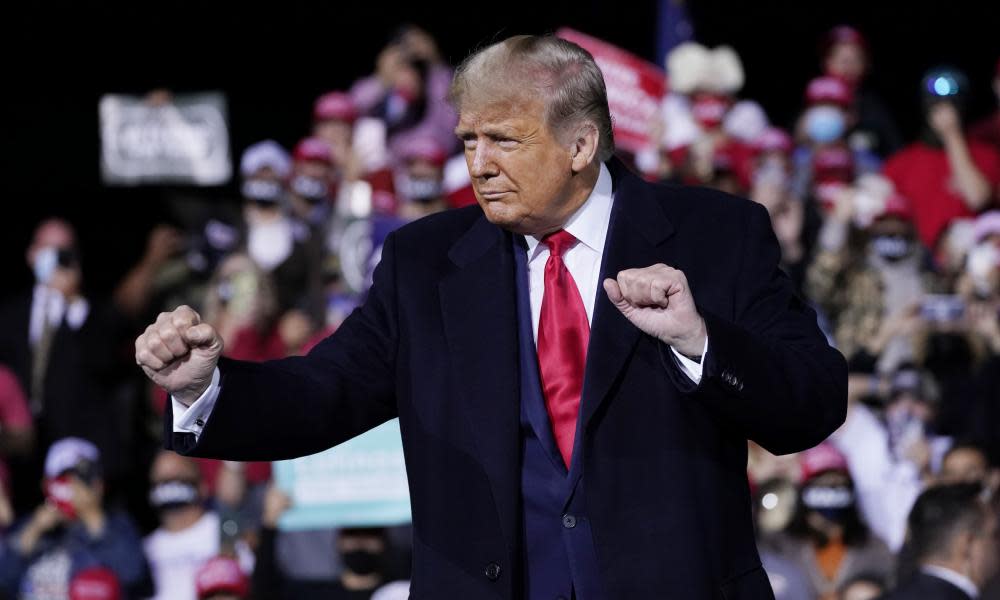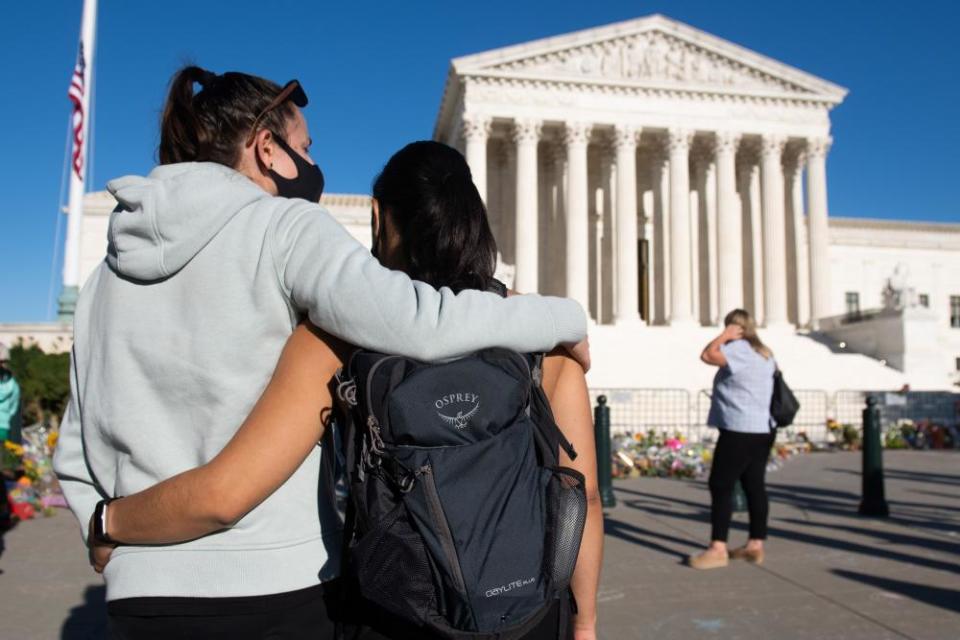'Fill that seat': why Trump's courts power grab is more than just a political win

Supporters of Donald Trump hit on a new chant at a campaign rally in North Carolina at the weekend.
In 2016, it was “Lock her up! Lock her up!”
In 2020, it’s “Fill that seat! Fill that seat!”
The “seat”, of course, refers to the supreme court vacancy created with the death on Friday of Ruth Bader Ginsburg, the liberal justice whose replacement with a conservative by Trump could remake American life under the law for generations.
For the aggressively informal air of a typical Trump event, a supreme court-themed chant might not seem like an obvious crowd-shaking rallying cry. But Trump’s success at appointing conservative judges is not only a political winner for Trump: it amounts to a true and towering legacy.
Related: 'I'm saving her for Ginsburg': who is Amy Coney Barrett, Trump's likely supreme court pick?
“I’m going to be up to 280 judges very soon,” Trump bragged to the journalist Bob Woodward in remarks that Woodward captured on tape and released Sunday. “Nobody’s ever had that. Two hundred and eighty. You know? Nobody’s ever had that.”
Trump’s number was characteristically inflated: the number of judges he has placed on district- and circuit-court benches and the supreme court totals 214 (out of 865 total); a Ginsburg replacement would make 215.
But Trump was exactly right that “nobody’s ever had that” many appointees to the bench so quickly – meaning that no president has done more to shape the future of American life under the law on issues from discrimination claims to marriage equality to gun control.
Trump is trying to boost Republican turnout in the election by communicating that the fate of the landmark Roe v Wade supreme court ruling protecting abortion rights is on the line, said Nan Aron, president of the progressive Alliance for Justice advocacy group.
“Republicans have long seized on the judiciary as a reliable tool to galvanize their base before an election,” Aron said. “It strikes me at this point it’s a desperate measure on the part of this administration, to appeal to their voters to actually go to the polls.”

Trump has been so successful at securing the support of his conservative base, and so successful at appointing judges, however, that he may run the risk of finding that the political utility of the judges issue is diminished in the upcoming election.
Most people who might support Trump already do, polling indicates – and he’s already delivered so mightily on remaking the judiciary that some voters could see his work here as done.
The supreme court was considered a “very important” issue with 70% of Trump voters in 2016, according to Pew Research polling; four years and two, maybe three supreme court appointments later, that number has slid to 61%.
There are signs, meanwhile, that Trump’s courts power grab has motivated Democrats mightily – especially with the Ginsburg seat in play. Supporters have donated about about $100m for Democratic senate candidates since Ginsburg’s death, New York magazine reported. The proportion of Democratic voters rating the supreme court as a “very important” issue has grown from 62% in 2016 to 66% this year, according to Pew.
I think we’ll see thousands, millions of Americans prioritize the courts primarily out of fear that everything they hold dear ... will be threatened
Nan Aron
“Progressives are more galvanized today than ever before,” Aron said. “I think we’ll see thousands, millions of Americans prioritize the courts primarily out of fear that everything they hold dear – workers’ rights, consumer protections, civil and women’s rights and, most importantly, healthcare – will be threatened.”
Trump was able to pull off the hundreds-of-judges feat by turning the process almost entirely over to conservative legal activists and to the Senate majority leader, Mitch McConnell, who created many of the vacancies in the first place by blocking Barack Obama appointees.
Trump told Woodward those vacancies were “golden nuggets” and it is quite clear what Trump bought with them: the faithful support of evangelical Christian and conservative Republican voters for whom restrictions on abortion and immigration, the elimination of environmental regulations and the ability to restrict access to voting are top political objectives.
Eight in 10 white evangelical Protestant registered voters would vote for Trump or lean toward voting for him in November, according to a July survey by Pew Research. Those voters reliably cite Trump’s performance on judges as the factor that made them set aside whatever personal reservations they might have about the president.
Trump has worked relentlessly to woo his base. And as election day approaches, he has shared his vision for a capstone on his judiciary project: a third supreme court justice in just four years.
In his conversation with Woodward, Trump credited McConnell with powering the effort.
“You know what Mitch’s biggest thing is in the whole world? His judges,” Trump told Woodward. “He will absolutely ask me, please let’s get the judge approved instead of 10 ambassadors.”


